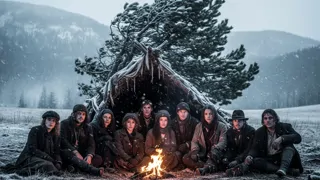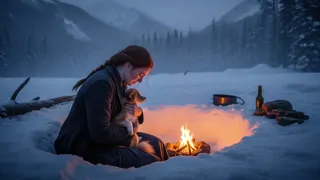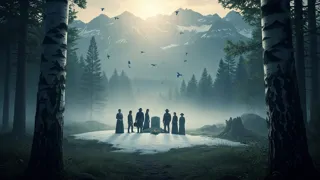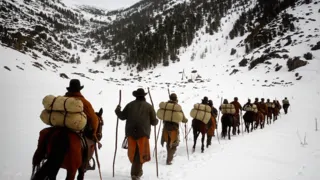Introduction
The first rays of dawn barely warmed the winter air above Poker Flat, a remote mining settlement perched on the shoulders of California’s cloud-brushed Sierra Nevada. It was late December 1852, and rumors had run like wildfire up and down Front Street, crackling through rough-timbered saloons, drifting beneath doors closed against icy gusts. Overnight, a shadow had passed through the town’s conscience: Poker Flat’s self-appointed committee, seeking to rinse away sin and scarecrow its luck back from a run of bad fortune and violence, had drawn up a list. By lantern light, men and women of all trades held their breath, not knowing who would be judged too unruly, too different, or just unlucky enough to be marked for exile.
At sunrise, four were chosen. John Oakhurst—the gambler known for his still hand and quiet dignity—headed the group. Tall, lean, pale-eyed, he carried himself with an unruffled calm at odds with his disputed reputation. Duchess and Mother Shipton, women branded as harlots for the truths and comforts they sold, followed. Young Tom Simson, or “The Innocent,” clung to his fiancée, Piney Woods, who’d stowed away alongside him out of love and a fierce, unaffected hope. Fated to leave together, the outcasts gathered their scant belongings under the watchful eyes of townsfolk, then set off—four grown, one unexpected child of luck, and a girl risking everything for the man she loved.
As they turned their backs on Poker Flat’s frosted shacks, the mountains loomed ahead, a tapestry braided from snow, pine shadow, and ruthless beauty. Their trek had scarcely begun, yet each footstep already echoed with doubt and the unspoken ache of new beginnings. For all that they carried, heavier still were guilt, resentment, and a longing—shared but rarely voiced—for a place that might, despite the odds, call them home.
Exile’s Road
The banished party pressed on, boots crunching over brittle snow, breath clouding in the winter air. The Sierras rose before them—a wall of pine, granite, and sky claiming sun and warmth for itself, while casting long, merciless shadows below.

Oakhurst took the lead, steady and uncomplaining, confidence masking a familiar, gnawing loneliness. Duchess, wrapped in her tattered shawl, walked beside Mother Shipton, both women’s faces set like stone against the biting cold. Tom Simson and Piney Woods, still buoyed by the glow of forbidden love, lagged behind with hands clasped, failing to hide their worry. Each mile seemed to strip them of little luxuries—a dry pair of socks, matches, bread crumbs—leaving them more exposed to nature and to one another.
The party found a frozen stream and followed its twisting course higher into the high country, passing burnt stumps and blackened rings where miners’ fires had long ago scorched away the wilder undergrowth. The trees closed in around them, their tall, snow-laden boughs sighing in the wind or creaking mournfully above. Oakhurst scouted ahead, patience guiding his every decision. He chose a sheltered hollow for the night, a place ringed by firs where wind might lose its teeth. A fire, coaxed from a mere handful of splinters, sputtered to life. Tall tales were traded—Piney, sweet-voiced, sang a song that lifted spirits and drew a shy smile from Duchess.
Come morning, a heavy sky promised snow. The pass ahead, Oakhurst warned, would be treacherous if not crossed quickly, but exhaustion and a growing reluctance kept them slow. As they climbed, the land pressed in: blue-tinged shadows sharpened beneath the trees; silence fell except for the rasp of boots on ice and the distant caw of a lone crow.
It was hunger, more than the snow, that first settled malice among the group. Provisions dwindled—Mother Shipton hoarded crumbs for Piney and Tom, quietly going without. Duchess stitched together scraps of hope, recounting dreams of distant cities where money and judgment weighed less. Oakhurst kept to solitude, awareness honed by years of reading men and fate alike, while Tom cursed his own inexperience.
When the storm struck, it swept in wild and white, lashing the camp with wind and erasing their tracks. The outcasts struggled to keep the fire alive beneath the onslaught, banding together beneath a leaky canvas. Nights grew colder; days, shorter. Bonds deepened—resentment softened into collaboration, and mistrust, into small acts of tenderness. Duchess, whose laughter had earned her banishment, soothed Piney during her faint spells; Oakhurst gave up his own blanket on the coldest night, standing guard while the others huddled together.
Lost in unrelenting snow, their sense of time evaporated. Tom, dogged by guilt, ventured out in hope of finding help, never to return during the worst of the storm. As the blizzard raged and hope thinned, the group, hungry and bone-tired, leaned against one another for warmth and solace, bracing to see another sunrise.
The Shadow of Winter
When the wind slackened and dawn oozed faintly through a gauze of clouds, silence had transformed the landscape. The trees stood like mourners and the world beyond camp was pressed flat under a thick, seamless quilt of snow. Within their makeshift refuge, Duchess and Mother Shipton exchanged whispered tales to keep spirits from evaporating. They clung to illusions of rescue and the dream of a gentler spring.

Mother Shipton’s strength diminished, her face grown gaunt and luminous. Each day, she had quietly tucked away food for Piney and Tom, lying to the others about her own need. Duchess, braver than others guessed, begged Oakhurst to save himself, but he shook his head, unwilling to abandon hope or company.
On the storm’s fifth day, they discovered with dawning horror that Mother Shipton had not survived the night. Duchess sobbed, holding Piney tightly. Oakhurst, grieving but resolute, set her to rest near the roots of an old pine—the first grave the blizzard would claim. That night, Duchess told her story: not of disgrace, as Poker Flat had believed, but of failed love, shattered dreams, and the defiance of hope’s last breath.
Then, the wind broke. A clear, steely blue sky spread over the ridges and light snow-dust sparkled on every branch. Oakhurst read the signs: the pass below was still impassable but perhaps not forever. He marshaled what strength remained in the group. Piney, her hands raw and cheeks hollow, clung fiercely to the possibility of Tom’s return. Duchess, with renewed tenderness, gave away her last biscuit to Piney.
Days bled one into the next, and hunger made their world shrink to footsteps around the fire and dreams of Poker Flat’s far-off warmth. Each person’s story was revealed in fragments: Oakhurst recalled a boyhood lost to circumstance, outlining a heart no gambler could bluff. Duchess prayed aloud, her voice soft yet fierce as the wind outside.
At last, the sky darkened once more—the storm’s grudge not yet spent. Oakhurst, sensing time’s urgency, slipped away that night, leaving his few possessions and a note beside the camp: TRUST. HOPE. He meant to seek rescue, though perhaps, deep down, he meant to spare the others his own last risk.
Duchess and Piney found comfort in closeness, drawing from each other a final flame of hope. Alone, hungry, yet united by sacrifice, the outcasts braced for the story’s unwritten end.
Redemption in the White Silence
The blizzard finally relented, surrendering the mountains to a breathless, crystalline hush. Three days passed in that deep, unearthly silence, broken only by the soft collapse of snow from laden branches and the stuttering cry of a distant jay. Duchess and Piney slept fitfully, hunger dulling all senses but the ache for companionship.

It was on the third day—a day that felt timeless and adrift—that a search party from Poker Flat, spurred at last by guilt and rumor, pressed up through drifting snow. They found the camp silent, half-buried beneath its white cocoon. In the makeshift shelter, Duchess and Piney were discovered side by side, arms entwined, frozen together in peaceful repose that rendered their prior burdens almost invisible.
The rescuers searched for Oakhurst, following tracks that ended beneath a lone pine. There he sat, back braced against an upturned log, revolver by his side, gaze directed down the distant gorge. In his lap, they discovered a folded scrap of paper—a message scrawled in deliberate hand: "Beneath the snow, hearts may thaw. Forgive, and you will be forgiven. —J.O."
Even among the weathered men of Poker Flat, hard eyes grew wet as they collected those who had suffered for the town’s conscience. Stories scattered quickly across the gold camps: of courage in the face of winter, kindness born in exile’s sharp hour, and of outcasts who clung to one another when the world cast them out.
Spring, when it arrived, melted away the snow and drew green across the pines. At the base of that hill, a simple cairn marked the place where hope and regret had mixed—not just for those lost, but for all who were ever made to wander. In time, the story of the outcasts of Poker Flat softened the town’s heart and taught those who remained that mercy, not judgment, is the true sign of civilization.
For a handful of winter weeks, castaways had survived on little more than courage, forgiveness, and the will to reach for warmth in the arms of strangers. Against the silence, their lives echoed—a testament to all who seek home in a world too willing to close its doors.
Conclusion
In the harsh crucible of the Sierra winter, the outcasts of Poker Flat were not defined by their vices or their exile, but by the courage and tenderness they found within themselves—and in each other. Cast from a town eager to preserve its own image, they forged unlikely alliances, sacrificing for strangers and friends alike as the world grew cold around them. In their brief, desperate struggle, they kindled a flame of forgiveness that would outburn any bonfire of condemnation. Long after the snow had melted and their names faded in Poker Flat’s ledgers, the story lingered: of hearts changed, wounds reconciled, and a hard-won hope rising even in the bleakest season. The Sierras, vast and indifferent, bear silent witness to such redemptions—whispered in every pine-shadow and in the slow, returning warmth of spring.

















